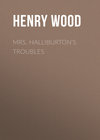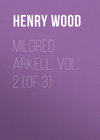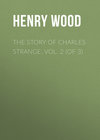Czytaj książkę: «Mildred Arkell. Vol. 3 (of 3)», strona 5
CHAPTER V.
ASSIZE SUNDAY
The next day was Assize Sunday. A dense crowd collected early round the doors of the cathedral, and, as soon as they were opened, rushed in, and took possession of the edifice, leaving vacant only the pulpit, the bishop's throne, and the locked-up seats. It was the custom for the bishop (if in Westerbury), the dean and chapter, and the forty king's scholars, to assemble just inside the front entrance and receive the judges, who were attended in state to the cathedral, just as they had been attended into Westerbury the previous afternoon, the escort being now augmented by the mayor and corporation, and an overflowing shoal of barristers.
The ten choristers were the first to take up their standing at the front entrance. They were soon followed by the rest of the king's scholars, the surplices of the whole forty being primly starched for the occasion. They had laid in their customary supply of pins, for it was the boys' pleasure, during the service on Assize Sunday, to stick pins into people's backs, and pin women's clothes together; the density of the mob permitting full scope to the delightful amusement, and preventing detection.
The thirty king's scholars bustled in from the cloisters two by two, crossed the body of the cathedral to the grand entrance, and placed themselves at the head of the choristers. Which was wrong: they ought to have gone below them. Henry Arkell, as senior chorister, took precedence of all when in the cathedral; but not when out of it, and that was a somewhat curious rule. Out of the cathedral, Arkell was under Prattleton; the latter, as senior boy, being head of all. He told Prattleton to move down.
Prattleton declined. "Then we must move up," observed Henry. "Choristers."
He was understood: and the choristers moved above the king's scholars.
"What do you mean by that?" demanded Prattleton. "How dare you disobey me, Mr. Arkell?"
"How dare you disobey me?" was Henry Arkell's retort, but he spoke civilly. "I am senior here, and you know it, Prattleton." It must be understood that this sort of clashing could only occur on occasions like the present: on ordinary Sundays and on saints' days the choristers and king's scholars did not come in contact in the cathedral.
"I'll let you know who's senior," said Prattleton. "Choristers, move down; you juniors, do you hear me? Move down, or I'll have you hoisted to-morrow."
"If Mr. Arkell tells us, please, sir," responded a timid junior, who fancied Mr. Prattleton looked particularly at him.
The choristers did not stir, and Prattleton was savage. "King's scholars, move up, and shove."
Some of the king's scholars hesitated, especially those of the lower school. It was no light matter to disobey the senior chorister in the cathedral. Others moved up, and proceeded to "shove." Henry Arkell calmly turned to one of his own juniors.
"Hardcast, go into the vestry, and ask Mr. Wilberforce to step here. Should he have gone into college, fetch him out of the chanting-desk."
"Remain where you are, Hardcast," foamed Prattleton. "I dare you to stir."
Hardcast, a little chap of ten, was already off, but he turned round at the word. "I am not under your orders, Mr. Prattleton, when the senior chorister's present."
A few minutes, and then the Reverend Mr. Wilberforce, in his surplice and hood, was seen advancing. Hardcast had fetched him out of the chanting-desk.
"What's all this? what hubbub are you boys making? I'll flog you all to-morrow. Arkell, Prattleton, what's the matter?"
"I thought it better to send for you, sir, than to have a disturbance here," said Arkell.
"A disturbance here! You had better not attempt it."
"Don't the king's scholars take precedence of the choristers, sir?" demanded Prattleton.
"No, they don't," returned the master. "If you have not been years enough in the college to know the rules, Mr. Prattleton, you had better return to the bottom of school, and learn them. Arkell, in this place, you have the command. King's scholars move down, and be quick over it: and I'll flog you all round," concluded Mr. Wilberforce, "if you strike up a dispute in college again."
The master turned tail, and strode back as fast as his short legs would carry him: for the dean and chapter, marshalled by a verger and the bedesmen, were crossing the cathedral; and a flourish of trumpets, outside, told of the approach of the judges. The Reverend Mr. Wilberforce was going to take the chanting for an old minor canon whose voice was cracked, and he would hardly recover breath to begin.
The choristers all grinned at the master's decision, save Arkell and Aultane, junior: the latter, though second chorister, took part with Prattleton, because he hated Arkell; and as the judges passed in their flowing scarlet robes with the trains held up behind, and their imposing wigs, so terrible to look at, the bows of the choristers were much more gracious than those of the king's scholars. The additional mob, teeming in after the judges' procession, was unlimited; and a rare field had the boys and their pins that day.
The hubbub and the bustle of the morning passed, and the cathedral bell was again tolling out for afternoon service. Save the dust, and there was plenty of that, no trace remained of the morning's scene. The king's scholars were already in their seats in the choir, and the ten choristers stood at the choir entrance, for they always waited there to go in with the dean and chapter. One of them, and it was Mr. Wilberforce's own son, had made a mistake in the morning in fastening his own surplice to a countrywoman's purple stuff gown, instead of two gowns together; and, when they came to part company, the surplice proved the weakest. The consequence was an enormous rent, and it had just taken the nine other choristers and three lay-clerks five minutes and seventeen pins, fished out of different pockets, to do it up in any way decent. Young Wilberforce, during the process, rehearsing a tale over in his mind, for home, about that horrid rusty nail that would stick out of the vestry door.
The choristers stood facing each other, five on a side, and the dean and canons would pass between them when they came in. They stood at an equidistance, one from the other, and it was high treason against the college rules for them to move an inch from their places. Arkell headed one line, Aultane the other, the two being face to face. Suddenly a college boy, who was late, came flying from the cloisters and dashed into the choir, to crave the keys of the schoolroom from the senior boy, that he might procure his surplice. It was Lewis junior; so, against the rules, Prattleton condescended to give him the keys; almost any other boy he would have told to whistle for them, and marked him up for punishment as "absent." Prattleton chose to patronise him, on account of his friendship with Lewis senior. Lewis came out again, full pelt, swinging the keys in his hand, rather vain of showing to the choristers that he had succeeded in obtaining them, just as two little old gentlemen were advancing from the front entrance.
"Hi, Lewis! stop a moment," called out Aultane, in a loud whisper, as he crossed over and went behind Arkell.
"Return to your place, Aultane," said Arkell.
Mr. Aultane chose to be deaf.
"Aultane, to your place," repeated Henry Arkell, his tone one of hasty authority. "Do you see who are approaching?"
Aultane looked round in a fluster. But not a soul could he see, save a straggler or two making their way to the side aisles; and two insignificant little old men, arm-in-arm, close at hand, in rusty black clothes and brown wigs. Nobody to affect him.
"I shall return when I please," said he, commencing a whispered parley with Lewis.
"Return this instant, Aultane. I order you."
"You be–"
The word was not a blessing, but you are at liberty to substitute one. The little old men, to whom each chorister had bowed profoundly as they passed him, turned, and bent their severe yellow faces upon Aultane. Lewis junior crept away petrified; and Aultane, with the red flush of shame on his brow, slunk back to his place. They were the learned judges.
They positively were. But no wonder Aultane had failed to recognise them, for they bore no more resemblance to the fierce and fiery visions of the morning, than do two old-fashioned black crows to stately peacocks.
"What may your name be, sir?" inquired the yellower of the two. Aultane hung his head in an agony: he was wondering whether they could order him before them on the morrow and transport him. Wilberforce was in another agony, lest those four keen eyes should wander to his damaged surplice and the pins. Somebody else answered: "Aultane, my lord."
The judges passed on. Arkell would not look towards Aultane: he was too noble to add, even by a glance, to the confusion of a fallen enemy: but the other choristers were not so considerate, and Aultane burst into a flow of bad language.
"Be silent," authoritatively interrupted Henry Arkell. "More of this, and I will report you to the dean."
"I shan't be silent," cried Aultane, in his passionate rage. "There! not for you." Beside himself with anger, he crossed over, and raised his hand to strike Arkell. But one of the sextons, happening to come out of the choir, arrested Aultane, and whirled him back.
"Do you know where you are, sir?"
In another moment they were surrounded. The dean's wife and daughter had come up; and, following them, sneaked Lewis junior, who was settling himself into his surplice. Mrs. Beauclerc passed on, but Georgina stopped. Even as she went into college, she would sometimes stop and chatter to the boys.
"You were quarrelling, young gentlemen! What is the grievance?"
"That beggar threatened to report me to the dean," cried Aultane, too angry to care what he said, or to whom he spoke.
"Then I know you deserved it; as you often do," rejoined Miss Beauclerc; "but I'd keep a civil tongue in my head, if I were you, Aultane. I only wonder he has not reported you before. You should have me for your senior."
"If he does go in and report me, please tell the dean to ask him where his gold medal is," foamed Aultane. "And to make him answer it."
"What do you mean?" she questioned.
"He knows. If the dean offered him a thousand half-crowns for his medal, he could not produce it."
"What does he mean?" repeated Miss Beauclerc, looking at Henry Arkell.
He could not answer: he literally could not. Could he have dropped down without life at Georgina's feet, it had been welcome, rather than that she should hear of an act, which, to his peculiarly refined temperament, bore an aspect of shame so utter. His face flushed a vivid red, and then grew white as his surplice.
"He can't tell you," said Aultane; "that is, he won't. He has put it into pawn."
"And his watch too," squeaked Lewis, from behind, who had heard of the affair from Aultane.
Henry Arkell raised his eyes for one deprecating moment to Miss Beauclerc's face; she was struck with their look of patient anguish. She cast an annihilating frown at Lewis, and, raising her finger haughtily motioned Aultane to his place. "I believe nothing ill of you," she whispered to Henry, as she passed on to the choir.
The next to come in was Mr. St. John. "What's the matter?" he hurriedly said to Henry, who had not a vestige of colour in his cheeks or lips.
"Nothing, thank you, Mr. St. John."
Mr. St. John went on, and Lewis skulked to his seat, in his wake. Lewis's place was midway on the bench on the decani side, seven boys being above him and seven below him. The choristers were on raised seats in front of the lay-clerks, five on one side the choir, five opposite on the other; Arkell, as senior, heading the five on the decani side.
The dean and canons came in, and the service began. While the afternoon psalms were being sung, Mr. Wilberforce pricked the roll, a parchment containing the names of the members of the cathedral, from the dean downwards, marking those who were present. Aultane left his place and took the roll to the dean, continuing his way to the organ-loft, to inquire what anthem had been put up. He brought word back to Arkell, 'The Lord is very great and terrible. Beckwith.' Aultane would as soon have exchanged words with the yellow-faced little man sitting in the stall next the dean, as with Arkell, just then, but his duty was obligatory. He spoke sullenly, and crossed to his seat on the opposite side, and Arkell rose and reported the anthem to the lay-clerks behind him. Mr. Wilberforce was then reading the first lesson.
Now it happened that there was only one bass at service that afternoon, he on the decani side, Mr. Smith; the other had not come; and the moment the words were out of Arkell's mouth, "The Lord is very great. Beckwith," Mr. Smith flew into a temper. He had a first-rate voice, was a good singer, and being inordinately vain, liked to give himself airs. "I have a horrid cold on the chest," he remonstrated, "and I cannot do justice to the solo; I shan't attempt it. The organist knows I'm as hoarse as a raven, and yet he goes and puts up that anthem for to-day!"
"What is to be done?" whispered Henry.
"I shall send and tell him I can't do it. Hardcast, go up to the organ-loft, and tell–Or I wish you would oblige me by going yourself, Arkell: the juniors are always making mistakes. My compliments to Paul, and the anthem must be done without the bass solo, or he must put up another."
Henry Arkell, ever ready to oblige, left his stall, proceeded to the organ-loft, and delivered the message. The organist was wroth: and but for those two little old gentlemen, whom he knew were present, he would have refused to change the anthem, which had been put up by the dean.
"Where's Cliff, this afternoon?" asked he, sharply, alluding to the other bass.
"I don't know," replied Henry. "He is not at service."
The organist took up one of the anthem books with a jerk, and turned over its leaves. He came to the anthem, "I know that my Redeemer liveth," from the Messiah.
"Are you prepared to do justice to this?" he demanded.
"Yes, I believe I am," replied Henry. "But–"
"But me no buts," interrupted the organist, who was always very short with the choristers. "'I know that my Redeemer liveth. Pitt.'"
As Henry Arkell descended the stairs, Mr. Wilberforce was concluding the first lesson. So instead of giving notice of the change of anthem to Mr. Wilberforce and the singers on the cantori side, he left that until later, and made haste to his own stall, to be in time for the soli parts in the Cantate Domino, which was being sung that afternoon in place of the Magnificat. In passing the bench of king's scholars, a foot was suddenly extended out before him, and he fell heavily over it, striking his head on the stone step that led to the stalls of the minor canons. A sexton, a verger, and one or two of the senior boys, surrounded, lifted, and carried him out.
The service proceeded; but his voice was missed in the Cantate; Aultane's proved but a poor substitute.
"I wonder whether the anthem's changed?" debated the bass to the contre tenor.
"Um—no," decided the latter. "Arkell was coming straight to his place. Had there been any change, he would have gone and told Wilberforce and the opposites. Paul is in a pet, and won't alter it."
"Then he'll play the solo without my accompaniment," retorted the bass, loftily.
Henry Arkell was only stunned by the fall, and before the conclusion of the second lesson, he appeared in the choir, to the surprise of many. After giving the requisite notice of the change in the anthem to Mr. Wilberforce and Aultane, he entered his stall; but his face was white as the whitest marble. He sang, as usual, in the Deus Misereatur. And when the time for the anthem came, Mr. Wilberforce rose from his knees to give it out.
"The anthem is taken from the burial service."
The symphony was played, and then Henry Arkell's voice rose soft and clear, filling the old cathedral with its harmony, and the words falling as distinctly on the ear as if they had been spoken. "I know that my Redeemer liveth, and that he shall stand at the latter day upon the earth. And though after my skin worms destroy this body, yet in my flesh I shall see God: whom I shall see for myself, and mine eyes shall behold, and not another." The organist could not have told why he put up that particular anthem, but it was a remarkable coincidence, noticed afterwards, that it should have been a funeral one.
But though Henry Arkell's voice never faltered or trembled, his changing face spoke of bodily disease or mental emotion: one moment it was bright as a damask rose, the next of a transparent whiteness. Every eye was on him, wondering at the beauty of his voice, at the marvellous beauty of his countenance: some sympathised with his emotion; some were wrapt in the solemn thoughts created by the words. When the solo was concluded, Henry, with an involuntary glance at the pew of Mrs. Beauclerc, fell against the back of his stall for support: he looked exhausted. Only for a moment, however, for the chorus commenced.
He joined in it; his voice rose above all the rest in its sweetness and power; but as the ending approached, and the voices ceased, and the last sound of the organ died upon the ear, his face bent forward, and rested without motion on the choristers' desk.
"Arkell, what are you up to?" whispered one of the lay-clerks from behind, as Mr. Wilberforce recommenced his chanting.
No response.
"Nudge him, Wilberforce; he's going to sleep. There's the dean casting his eyes this way."
Edwin Wilberforce did as he was desired, but Arkell never stirred.
So Mr. Tenor leaned over and grasped him by the arm, and pulled him up with a sudden jerk. But he did not hold him, and the poor head fell forward again upon the desk. Henry Arkell had fainted.
Some confusion ensued: for the four choristers below him had every one to come out of the stall before he could be got out. Mr. Wilberforce momentarily stopped chanting, and directed his angry spectacles towards the choristers, not understanding what caused the hubbub, and inwardly vowing to flog the whole five on the morrow. Mr. Smith, a strong man, came out of his stall, lifted the lifeless form in his arms, and carried it out to the side aisle, the head, like a dead weight, hanging down over his shoulder. All the eyes and all the glasses in the cathedral were bent on them; and the next to come out of his stall, by the prebendaries, and follow in the wake, was Mr. St. John, a flush of emotion on his pale face.
The dean's family, after service, met Mr. St. John in the cloisters. "Is he better?" asked Mrs. Beauclerc. "What was the matter with him the second time?"
"He fainted; but we soon brought him to in the vestry. Young Wilberforce ran and got some water. They are walking home with him now."
"What caused him to fall in the choir?" continued Mrs. Beauclerc. "Giddiness?"
"It was not like giddiness," remarked Mr. St. John. "It was as if he fell over something."
"So I thought," interrupted Georgina. "Why did you leave your seat to follow him?" she continued, in a low tone to Mr. St. John, falling behind her mother.
"It was a sudden impulse, I suppose. I was unpleasantly struck with his appearance as I went into college. He was looking ghastly."
"The choristers had been quarrelling: Aultane's fault, I am sure. He lifted his hand to strike Arkell. Aultane reproached him with having"—Georgina Beauclerc hesitated, with an amused look—"disposed of his prize medal."
"Disposed of his prize medal?" echoed Mr. St. John.
"Pawned it."
St. John uttered an exclamation. He remembered the tricks of the college boys, but he could not have believed this of his favourite, Henry Arkell.
"And his watch also, Lewis junior added," continued Georgina. "They gave me the information in a spiteful glow of triumph. Henry did not deny it: he looked as if he could not. But I know he is the soul of honour, and if he has done anything of the sort, those beautiful companions of his have over-persuaded him: possibly to lend the money to them."
"I'll see into this," mentally spoke Mr. St. John.




















